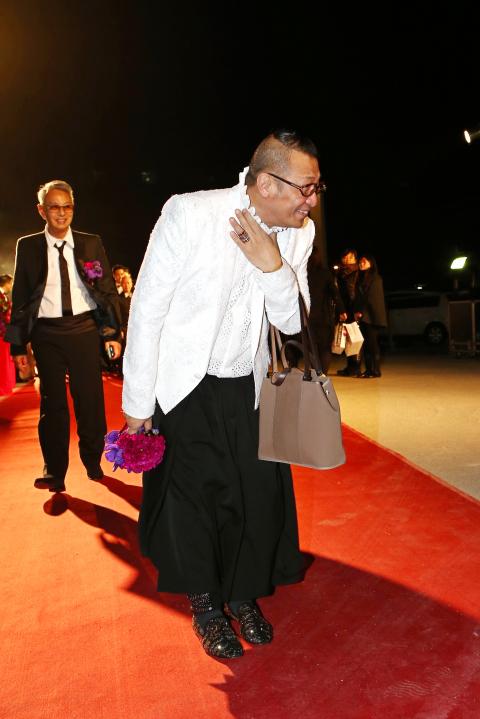As the year draws to an end, Taipei Watcher would like to thank readers for your support, as this columnist strives to raise awareness of lesbian, gay, bisexual and transgender (LGBT) issues and the various challenges facing them. And though challenges remain — Chinese Nationalist Party (KMT) Legislator Lu Hsueh-chang's (呂學樟) remarks on Monday at the Legislative Yuan that homosexuals are “scary” and that legalizing same-sex marriage is encouraging “bestiality” are just the latest example — positive signs have emerged for the LGBT community this year.
According to a survey by Gallup Inc, Taiwan was listed as the world’s 39th most LGBT-friendly country. Thirty-nine percent of respondents say the country is welcoming, while 42 percent say that it isn’t. Taiwan ranks second among all Asian countries surveyed, behind the Philippines, which is listed as the world’s 22nd most LGBT-friendly country.
The poll, conducted in 123 countries last year and released this year, saw 28 percent of respondents saying that their city or area is a “good place” for gays and lesbians to live. The world’s top three LGBT-friendly countries are the Netherlands, Iceland and Canada, where same-sex marriage is legally recognized. In 2001, the Netherlands became the world’s first country to legalize same-sex marriage.

Photo: Chen Yi-kuan, Taipei Times
“Hospitable attitudes range widely from as high as 83 percent in the Netherlands to as low as 1 percent in Pakistan and Senegal,” the poll says, adding that it was unable to conduct the survey in certain countries where homosexuality is legally banned, especially in some African and Muslim nations.
Take Taiwan’s neighboring country Indonesia for example. Only 2 percent of respondents say their country is a safe place for homosexuals to live. In September, lawmakers in the Indonesian province of Aceh even passed a law to punish gay sex publicly with 100 lashes.
ASIA’S BEST PLACE?

Photo courtesy of Warner Music
Taiwan is relatively friendly to LGBT people compared to most Asian countries. In October, the New York Times published a report, “For Asia’s gays, Taiwan stands out as beacon,” praising our open society. Gay Star News, an online news site, also released an article in 2012, “Why is Taiwan the best place to be gay in Asia?” in which it lauded our friendliness to homosexuals.
“Taiwanese culture is based on Confucianism, Taoism and Buddhism. Buddhists are very tolerant of almost everything because they think there’s a reason for it, so they have to respect it,” gay activist Nelson Chen (陳敬學) told the Web site.
“Another explanation is that because Taiwan has been occupied by the Dutch, the Spanish, China and Japan, Taiwanese have quickly adapted to different cultures. Also a lot of young Taiwanese go to study abroad and we get a lot of information from other countries because the Internet is not censored like it is in China,” Chen added.
Victoria Hsu (許秀雯), a lawyer and the CEO of Taiwan Alliance to Promote Civil Partnership Rights (伴侶盟) who was also interviewed, echoed Chen’s views.
“[Taiwan] is already a diverse society. So I think that’s one of the reasons we are a little bit more gay-friendly than some other Asian countries,” she said.
However, Hsu adds, discrimination against homosexuality now exists in a more subtle way.
“We don’t criminalize homosexual conduct in our Criminal Code — we don’t have such terrible laws. But in the employment area and some other areas there’s still a lot of discrimination against LGBT people,” she says.
GAYER MEANS HAPPIER
Gay Star News ran a report last year that showed that gay-friendly countries are the happiest in the world. It wrote that “countries that are highly accepting of gay people, and have progressive social attitudes towards homosexuality, rank highest in a list of the happiest nations in the world.”
The report was based on the Better Life Index — compiled annually by the Organization for Economic Co-operation and Development (OECD) — which ranked 36 countries according to 11 major criteria such as income, health and safety.
“Although a nation’s happiness is not measured primarily by support for their LGBT communities, all of the highest ranking countries are accepting of homosexuality, support equal rights and have laws protecting gay people,” the report wrote.
In a hope to make Taiwan a happier country too, six openly gay and lesbian candidates campaigned in the nine-in-one elections last month, hoping to build a gay-friendly environment. Unfortunately, they failed to get elected and only received a total of 19,152 votes.
On Dec. 6, “fashion godfather” Ivan Hong (洪偉明) and his boyfriend fashion designer Lu Fong-chi (呂芳智) held a wedding in Taipei to celebrate the 30th anniversary of their long-term relationship, and nearly 300 people, many of whom were celebrities, attended the party. The couple’s wedding caused a sensation. Two days later, the Chinese-language Apple Daily published an editorial praising their bravery, encouraging same-sex couples nationwide to hold weddings in public so more Taiwanese will pay attention to the issue. Isn’t it a pity that their union and all other same-sex couples’ unions are not legally recognized and protected in a nation that claims to promote human rights?
Last week, pop diva Jolin Tsai (蔡依林) released the music video of her new single, We’re All Different, Yet The Same (不一樣又怎樣), in which she held a same-sex wedding with actress Ruby Lin (林心如) to show her support for marriage equality (www.youtube.com/watch?v=C7hHofDW2ts). Statistics show that more LGBT-friendly countries are happier countries. Hopefully, Taiwanese can be inspired by Tsai’s effort and turn Taiwan into Asia’s most gay-friendly nation in the coming year, so all of us can live happier lives.

April 14 to April 20 In March 1947, Sising Katadrepan urged the government to drop the “high mountain people” (高山族) designation for Indigenous Taiwanese and refer to them as “Taiwan people” (台灣族). He considered the term derogatory, arguing that it made them sound like animals. The Taiwan Provincial Government agreed to stop using the term, stating that Indigenous Taiwanese suffered all sorts of discrimination and oppression under the Japanese and were forced to live in the mountains as outsiders to society. Now, under the new regime, they would be seen as equals, thus they should be henceforth

Last week, the the National Immigration Agency (NIA) told the legislature that more than 10,000 naturalized Taiwanese citizens from the People’s Republic of China (PRC) risked having their citizenship revoked if they failed to provide proof that they had renounced their Chinese household registration within the next three months. Renunciation is required under the Act Governing Relations Between the People of the Taiwan Area and the Mainland Area (臺灣地區與大陸地區人民關係條例), as amended in 2004, though it was only a legal requirement after 2000. Prior to that, it had been only an administrative requirement since the Nationality Act (國籍法) was established in

Three big changes have transformed the landscape of Taiwan’s local patronage factions: Increasing Democratic Progressive Party (DPP) involvement, rising new factions and the Chinese Nationalist Party’s (KMT) significantly weakened control. GREEN FACTIONS It is said that “south of the Zhuoshui River (濁水溪), there is no blue-green divide,” meaning that from Yunlin County south there is no difference between KMT and DPP politicians. This is not always true, but there is more than a grain of truth to it. Traditionally, DPP factions are viewed as national entities, with their primary function to secure plum positions in the party and government. This is not unusual

US President Donald Trump’s bid to take back control of the Panama Canal has put his counterpart Jose Raul Mulino in a difficult position and revived fears in the Central American country that US military bases will return. After Trump vowed to reclaim the interoceanic waterway from Chinese influence, US Defense Secretary Pete Hegseth signed an agreement with the Mulino administration last week for the US to deploy troops in areas adjacent to the canal. For more than two decades, after handing over control of the strategically vital waterway to Panama in 1999 and dismantling the bases that protected it, Washington has